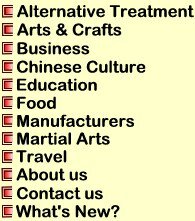|
|
|
|

|
|||
| (Posture of Army) |
|||
|
Requirements: |
|||
|
|
||||
|
(1) Inexhaustible haven and earth. |
||||
|
|
|||
|
(1) Momentum - like stones rolling in a torrent of water. |
|||
|
|
|||
|
(1) Order in the army is largely dependent on direction and organization. |
|||
|
(1) When not to put undue demand on his sub-ordinates. |
|||
|
|
|||
|
In the Company: |
|||
|
|
|
|
| (Weak and Strong Points) |
||||
|
|
||||
|
(1) Attacking enemy when they are at ease. |
||||
|
|
(1) Divide the enemy's strength by surprise attack. (2) Use full force to attack the divided enemy to win the battle. |
|||
| (1) Military tactics is like water flowing from high to low level. (2) The terrain always alters the run of the water which resembles the changing tactics of the enemy's movement. |
|||
|
|
|||
| (1) The ever changing Five Elements - Metal, Wood, Water, Fire and Earth. (2) Changeable four seasons. (3) Changeable length of days and nights. |
|||
|
|
|||
| In the Company: (1) Know adversary's capability and compare with own performance in order to survive in the market. (2) Alter strategy with changing market economy. |
|||
| (1) Attack the weak fronts, but avoid the strong. (2) |
|||
|
|
|||
|
|
|
(Maneuvering) |
||||
(1) Turning the devious into the direct. (2) Change all misfortune into gains. |
|||
|
|
|||
|
|
|||
|
(2) For an army travel continuously days & night to the war-zone without halt is not practical. |
|||
|
|
|||
| (1) Moving army as swift as the wind, gone without trace. |
|||
| (2) Moving quietly like the forest. |
|||
| (3) Raiding aggressively like the fire. |
|||
| (4) Holding a position like a mountain that cannot be moved. |
|||
| (5) Hiding in secret place without enemy knowing like the dark cloud covers the sky. |
|||
| (6) Attack like the speed of thunder so that enemy cannot parry. | |||
|
(A) Use of Drums and Banners & Flags in the battlefield. |
|||
|
Therefore: Avoid attacking the enemy when their spirit is high or looking forward to returning to camp in the evening. |
|||
| (1) Advancing uphill to fight the enemy is not favorable. | |||
| (2) Do not oppose enemy when they move downhill. | |||
| (3) Do not pursue an enemy who entices the fight. | |||
| (4) Do not attack when the enemy is in high spirits. | |||
| (5) Do not eat food offered by the enemy. | |||
| (6) Do not stop enemy returning to their camp. | |||
| (7) Leave an escape route for the enemy when surrounding them. | |||
| (8) Do not press or track after the fleeing foe too hard. | |||
| In the Company: (1) It is not wise to challenge a large corporation with solid foundation. (2) Rapid expansion may result in failure. (3) Analyze thoroughly before investing. (4) Aggressive advertising may help to revert the declining sales. |
|||
|
|
|
|
| (The Nine variables) |
||||
|
(1) An inaccessible area is not an ideal place to set up camp. |
||||
|
|
(1) Favorable and unfavorable factors must always be taken into consideration in any good or bad situation. (2) Do not assume the enemy will not come to attack because you are invincible, but always continue to set up strong and seamless tactics. |
|||
|
|
 |
|||
| (1) Dying is nothing but they could be killed. (2) The Cowardly and fearful could be captured. (3) The Quick-tempered cannot resist provocation. (4) The importance of reputation could easily be exploited by the enemy. (5) Compassionate nature will also be ceased upon by the enemy. |
||||
|
|
||||
|
|
|
|